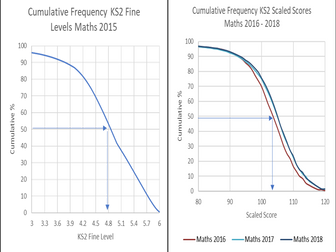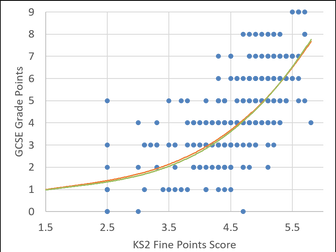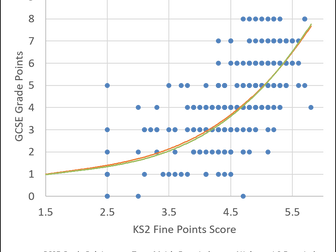Scaled score to fine level conversion & Attainment 8 changes 2016-19.
<p>These are resources for teachers, data managers or members of SLT responsible for attainment and progress.</p>
<p><strong>1. Resources for Converting KS2 scaled score to Equivalent Fine Levels</strong></p>
<p>They take KS2 national SAT data and gives a possible way to convert the KS2 scaled scores into equivalent fine levels so that the attainment 8 estimates for 2019 can be used to monitor the progress of learners in 2020 onwards.<br />
They also analyse the changes in attainment 8 data over the last 5 years, gives some possible explanations for the changes and why these should now stabilise.<br />
Finally there are resources for comparing a school’s KS2 SAT data fine level or scaled scores with national.</p>
<p><strong>2.Resources for KS4 target setting.</strong></p>
<p>These are resources that could be useful for seondary school senior leaders, subject leaders and data managers to set targets for the end of KS4. They are based on the KS2 SAT - KS4 GCSEs subject transition matrices using the 2019 data.</p>
<p>The techniques used are based on statistical and probability methodologies. You may initially have some difficulty with the concepts but with perseverance it should become clear.</p>
<p>In certain parts of the accompanying presentations I have drawn some conclusions e.g. regarding closing attainment gaps between genders and disadvantaged and non disadvantaged. These are my own and you may wish to draw alternative conclusions, all data and sources used are included to enable this.</p>
<p>There are several spreadsheets used included with the resources. These are locked to prevent accidental deletion of formulas used. If you need or wish to change any of these the password used is 1234.</p>
<p><strong>3. Resources comparing relative difficulty of KS4 qualifications.</strong></p>
<p>These resources use a combination of two sets of data from the DfE.</p>
<p>The 2019 KS2-KS4 transition matrices.</p>
<p>Data received under FOI request 2019-0040993: KS2-4 transition data for GCSE English language and mathematics for the cohorts for individual GCSE subjects.</p>
<p>The spreadsheet can be used to look at or determine</p>
<p>The “dependence” of the results in a GCSE subject of pupils’ prior performance as measured by KS2 SAT data in English reading and maths.<br />
The patterns in attainment and progress “gaps” in pupil performance due to gender, disadvantage, SEN and EAL characteristics.</p>
<p>The relative difficulty or leniency of grading in subject GCSEs compared to a subject cohorts’ performance in GCSE English language and maths.</p>
<p>It is for users to investigate and draw their own conclusions.</p>
<p>Over time I intend to add explanatory documents with my conclusions and opinions, which you are free to ignore.</p>
<p>The spreadsheet uses a small amount of visual basic for filtering so macros need to be enabled. These just to add additional functionality to the filtering in Excel.</p>


